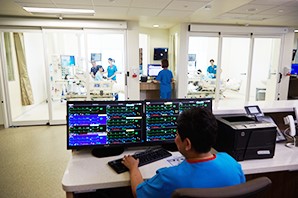Ng Teng Fong General Hospital is home to a pioneering Intensive Care Unit (ICU), offering high-quality, integrated care for critically ill patients in Singapore. Our ICU is the first in the nation to combine multiple subspecialty ICUs—medical, surgical, cardiac, and neurosurgical—along with their High Dependency Units (HDU) into a cohesive, multidisciplinary unit. This innovative approach ensures that patients with complex clinical conditions receive comprehensive and continuous care.
Our ICU is strategically located with direct connections to key hospital services, including the major operating theatres, Emergency Department, and Diagnostic Imaging, accessible via dedicated trauma lifts. These features enable prompt access and rapid response for critically ill patients, enhancing our ability to deliver timely interventions.
At the heart of our ICU is holistic patient care, facilitated by a dedicated team of critical care professionals. Our intensivists, trained in specialties such as respiratory medicine, emergency medicine, anaesthesia, and internal medicine, collaborate closely with intensive care nurses, respiratory therapists, pharmacists, physiotherapists, dietitians, and medical social workers to provide patient-centred care.
Our ICU complex includes 74 adaptable rooms with 34 currently opened, designed to seamlessly transition between ICU and HDU settings. Each room is equipped with windows that allow natural sunlight, contributing to a healing environment. For stable patients, two serene gardens and two roof terraces offer the opportunity to enjoy outdoor spaces, bask in sunlight, and benefit from the tranquillity of nature.
Automated Code Blue Service
We utilise the National Early Warning System (NEWS) integrated with vital signs monitoring from electronic health records. This automated system triggers an immediate response from the intensive care team, ensuring that critically ill patients receive life-saving interventions without delay.
Outreach Nursing & Automated Code Red zone alerts
Our highly trained intensive care nurses play a pivotal role through the Outreach Nursing programme. They proactively monitor at-risk patients using the National Early Warning Score (NEWS) and respond swiftly to prevent deterioration. This proactive approach ensures early intervention, enhancing patient outcomes in a dynamic healthcare environment.
PICS (Post ICU Care Syndrome) Clinic
The PICS Clinic provides specialised care for ICU survivors, addressing physical, cognitive and psychosocial challenges. Led by intensivists and Advanced Practice Nurses (APN), this clinic is dedicated to supporting patients as they regain their quality of life after critical illness.
IAmGoingHome
IAmGoingHome is a compassionate service, led by intensivists and nurses trained in palliative care, ensuring terminally ill patients can fulfil their final wishes by transitioning to their homes surrounded by loved ones during their last moments.
TELE NIV (Non Invasive Ventilator)
TELE NIV enables the healthcare team to provide NIV to patients throughout the hospital, with continuous remote monitoring by our trained respiratory therapists. This service ensures timely interventions, especially for patients in general wards, to optimise respiratory support and patient outcomes.
Music Therapy
Music therapy is incorporated into the ICU to alleviate stress and anxiety, helping patients experience emotional well-being and comfort during their recovery. Therapeutic music provides a sense of calm and emotional support, contributing to a healing environment.
VitalScout
VitalScout leverages wireless wearable technology for continuous monitoring of patients’ vital signs in general wards. This initiative supports real-time telemonitoring, optimizing nursing resources while enabling early detection of deteriorating conditions, leading to timely interventions by critical care and primary team and to improved patient outcomes.
Ng Teng Fong General Hospital is accredited by the College of Intensive Care Medicine (CICM, Australia & New Zealand) to offer unrestricted core training in Intensive Care Medicine, culminating in the prestigious Fellowship of CICM. Additionally, we are accredited by the Singapore Medical Council to provide a comprehensive 12-month fellowship in Intensive Care Medicine.
Through our strong partnerships with local institutions, we may facilitate exposure to various specialties, including anaesthesia, internal medicine, and cardiothoracic intensive care unit (CTICU), depending on availability and individual training needs.
As a recognized training site for local residency programs in Advanced Internal Medicine (AIM), Emergency Medicine (EM), and Advanced Specialist Training in Intensive Care Medicine (AST ICM), we are committed to nurturing the next generation of healthcare leaders. Our training curriculum emphasizes foundational skills in critical care, enhanced through simulation-based learning and clinical research. Trainees also gain proficiency in point-of-care ultrasonography for critically ill patients.
The Department also offers Clinical Fellowship Programs and specialized courses, including:
The Department also offers Clinical Fellowship Programmes. For more information, click here.

Mon - Sun & PH: 12.00pm - 8.30pm
Ng Teng Fong General Hospital
Tower B - Wards
Level 4